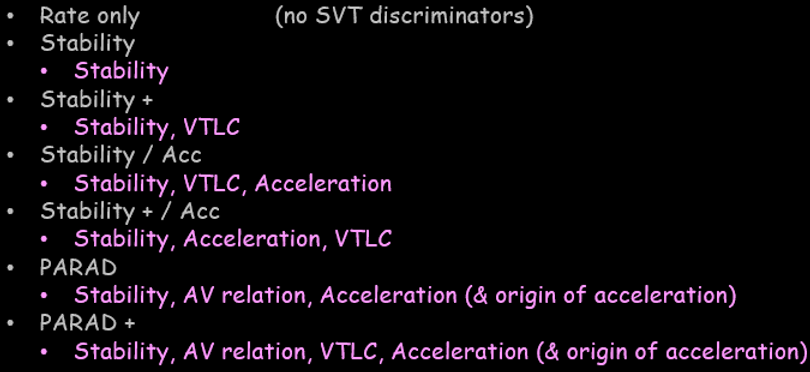Microport
Summary
RR stability
Stability +/VTCL
Acceleration
PARAD – P And R Based Arrhythmia Detection



Stability
Looks at 8 beats
•>6/8 (75%) RR stable = stable
•<6/8 (<75%) RR stable = unstable
Stable is considered anything that occurs in the programmable variability range
Can program different windows for FVT vs VT zones

PARAD
Associated PR (V=A)
For 1:1 AV arrhythmias: looks at 8 beats
•>6/8 (75%) PR stable = AV association
•<6/8 (<75%) PR stable = AV dissociation
Stable is considered anything that occurs in the programmable variability range
Associated PR (A>V)
For A>V arrhythmias: looks at 8 RRs, 15
•>7/15 PR stable = n:1 association
•<7/15 PR stable = AV dissociation
Stable is considered anything that occurs in the programmable variability range
Associated PR (A<V)
For A<V arrhythmias: looks at 8 RRs, 15
•>5/7 (75%) PR stable = AV association
•<5/7 (<75%) PR stable = AV dissociation
Stable is considered anything that occurs in the programmable variability range





VTCL/VTCL+
If a rhythm is stable, but has no P & R wave association, VTCL is applied
A cycle is considered long if the RR > average of the last 4 cycles in the Tachy/FV zone + a programmable gap (170 ms nominal)
A long cycle is consistent with AD Dx

Acceleration (onset)
Measures the % change in rate (RR interval) prior to detection (prior 4 beats to detection) and from detection (?1 RR interval from initial detection)

Origin of acceleration (chamber onset)
For 1:1 AV arrhythmias, where acceleration is confirmed, the 1st accelerated beat is assessed to determine where the arrhythmia originated from
To be considered associated the AV interval has to be within 50-300ms (when in DDD mode)
To be considered associated the PP & RR are assessed together to confirm conduction (when in AAI-DDD mode)







